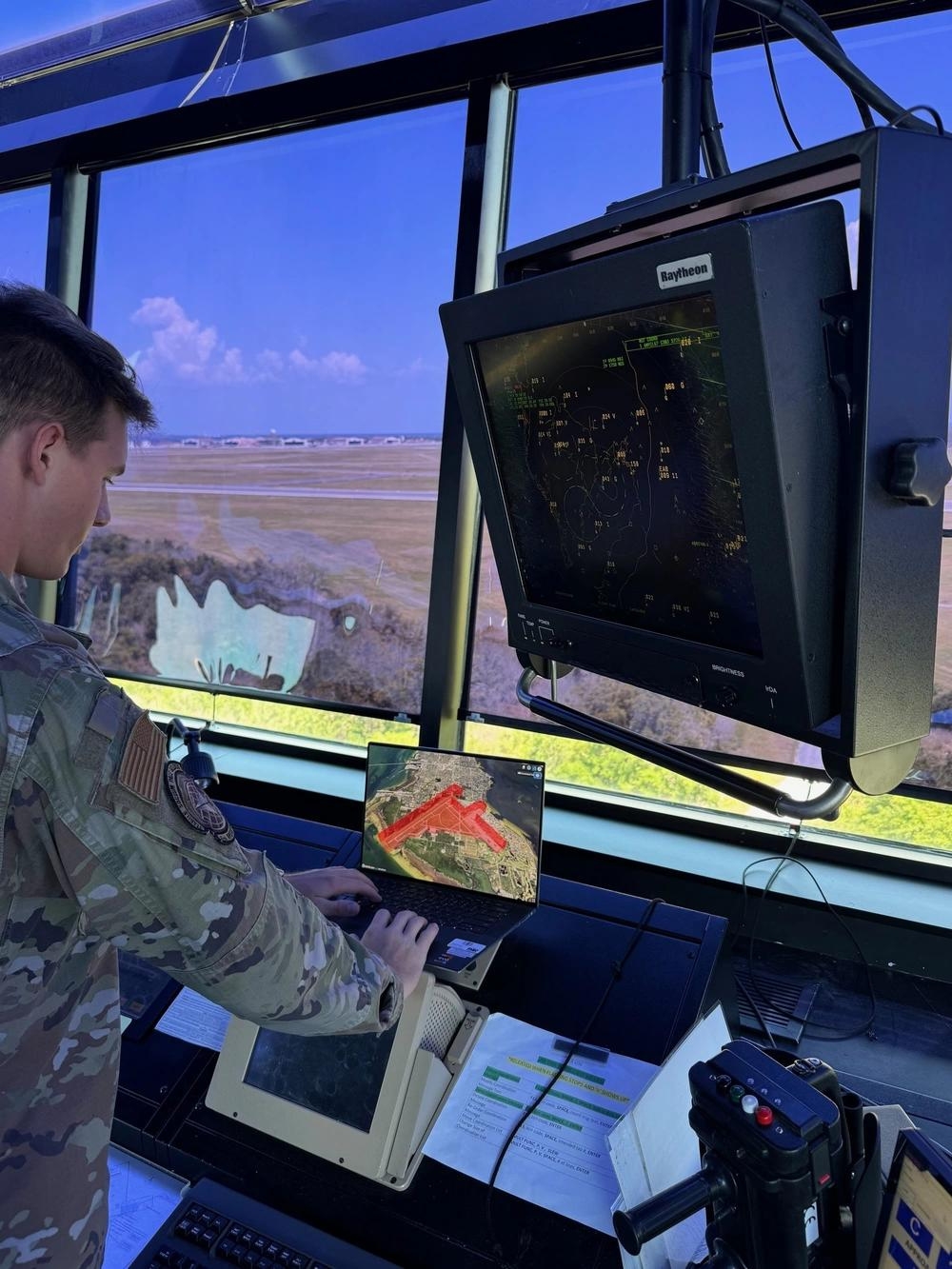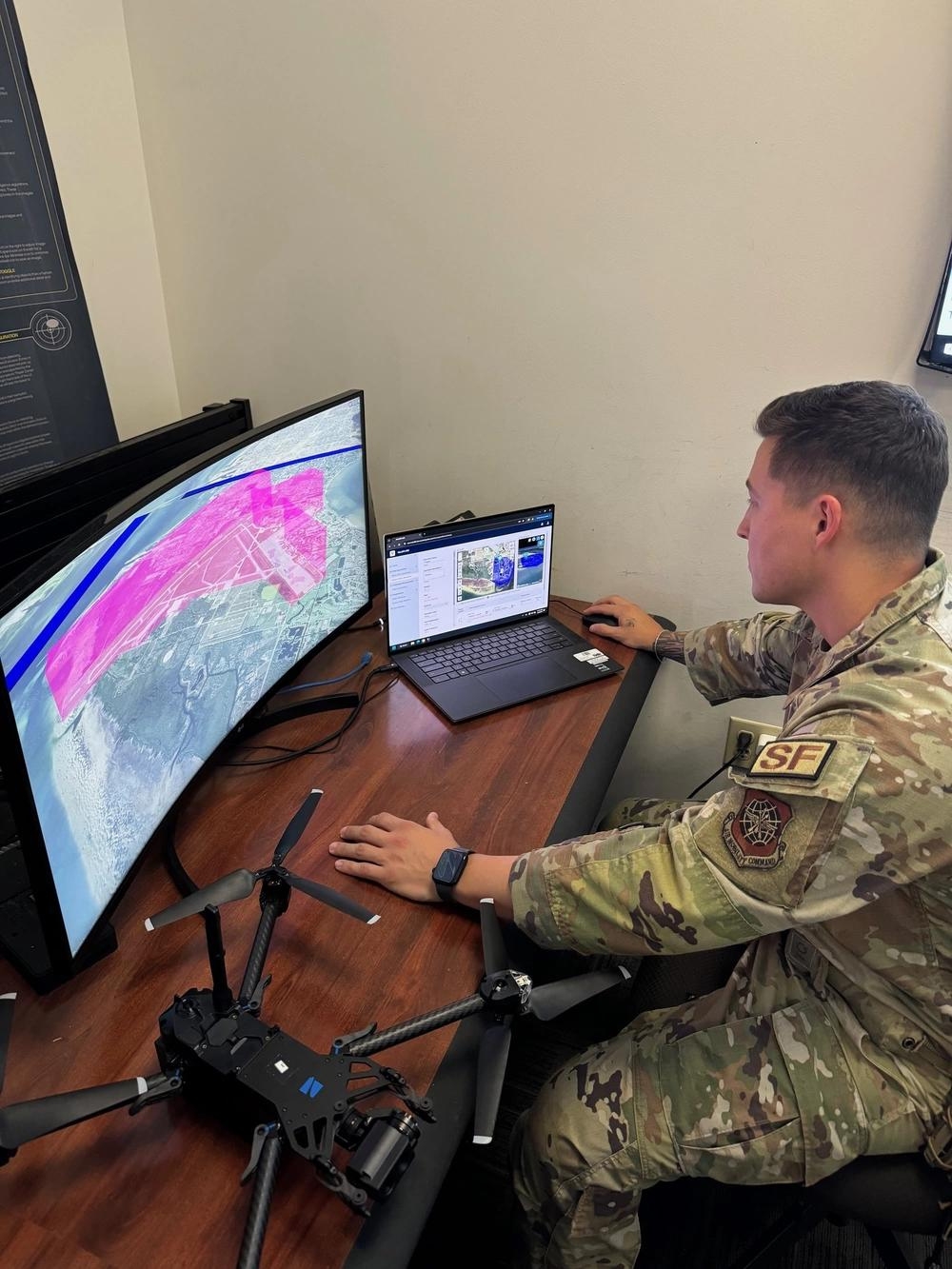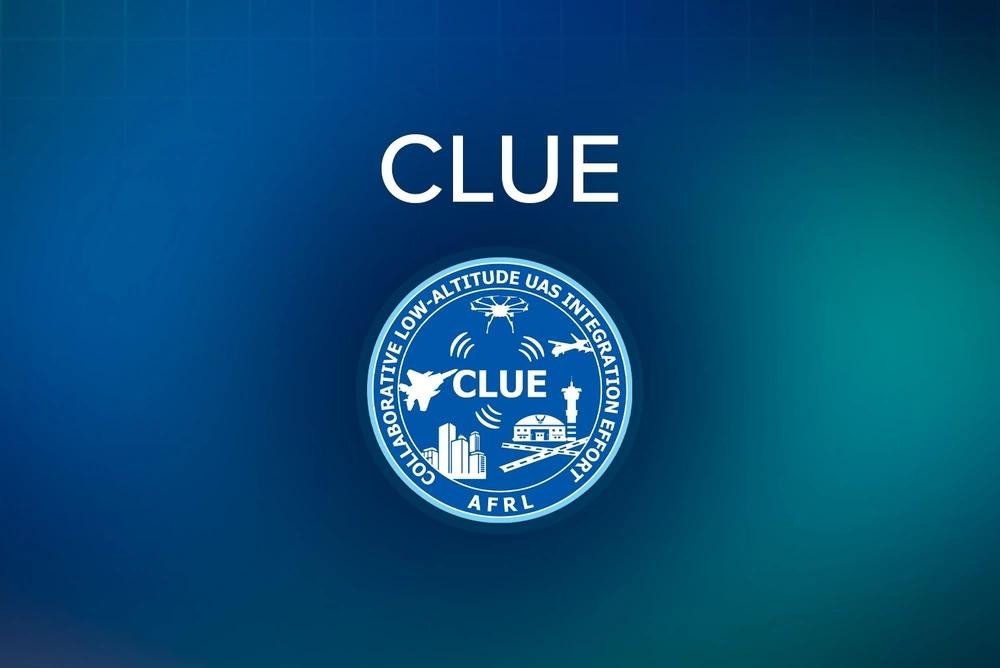AMC, AFRL pioneer UAS Traffic Management system at MacDill Air Force Base
MACDILL AIR FORCE BASE, Florida (AFRL) –Air Mobility Command, or AMC, in collaboration with the Air Force Research Laboratory, or AFRL, Information Directorate, began assessing the AFRL Collaborative Low-Altitude Unmanned Aircraft System Integration Effort, or CLUE, Unmanned Aircraft Systems Traffic Management, or UTM, system at MacDill Air Force Base in Florida. This assessment marks a significant milestone as MacDill Air Force Base became the first Department of the Air Force, or DAF, installation to use UTM capabilities within controlled airspace assigned to Department of Defense air traffic controllers. This ensures the safe operations of unmanned aerial vehicles, or UAS, alongside manned air operations, enhancing overall operational safety.

AFRL brought CLUE to the MacDill base in February 2022 to demonstrate its capabilities to personnel involved in UAS operations, particularly air traffic control and Security Forces. Initial testing focused on evaluating CLUE UTM capabilities for airspace deconfliction, communication and security to enable UAS operations beyond the visual line of sight.
Since then, through collaboration with the 6th Security Forces Squadron, 6th Operations Group, AMC Airfield Operations Division and Air Force Flight Standards Agency, it has been determined that the next phase of assessment should commence. Originally designed to be a DOD/Federal UAS service supplier, CLUE has been developed for two years at MacDill Air Force Base to help air traffic controllers by giving them a three-dimensional view to improve their existing procedures and allow automatic flight permission for UAS operators.
The CLUE program, initiated in 2016 at AFRL’s Information Directorate in Rome, New York, aims to prepare the Air Force and Department of Defense to use UAS on their installations through Security Forces, airfield management and civil engineering. The CLUE UTM provides air domain awareness, situational awareness and UTM operational capabilities for UAS operators, air traffic control personnel, Security Forces and other stakeholders.
“The Collaborative Low-altitude UAS Integration Effort, or CLUE, program has reached a significant milestone by enhancing our air traffic controllers’ abilities to ensure safe integration of sUAS within DOD controlled airspace by providing Air Domain and Situational Awareness,” said Master Sgt. Robert Minor, chief controller at MacDill Tower.

In May 2024, CLUE UTM began formal operational feasibility assessment activities, accessible by the Air Traffic Control Tower, the Base Defense Operations Center and Airfield Management.
“This is a significant milestone for AMC, AFRL and the CLUE program, as the MacDill Air Traffic Control Tower and Base Defense Operations Center are first in the Air Force to operationally assess UTM capabilities,” said Phil Zaleski, AFRL CLUE program manager and Information Convergence branch chief. “This milestone is recognized by the Office of the Undersecretary of Defense for Acquisition and Sustainment, or OUSD A&S, the Office of Primary Responsibility, or OPR, for UTM within the DOD.”
CLUE UTM is sensor-agnostic and capable of integrating with various sensors and systems developed to detect, track and identify UAS. At the base, this includes the Information Directorate Counter UAS systems, which are also under operational assessment.
According to James Layton, MacDill Air Force Base chief of plans and programs, the demand for the utility of drones continues to accelerate, “equipping airspace managers and UAS operators with a 3D operational viewing capability and additional features designed to reduce lengthy, manual and advanced planning procedures, will be critical to achieving real-time flight planning and mission execution.”
MacDill Air Force Base is proud to be one of the first DAF installations adopting this AFRL-developed technology and to demonstrate operational feasibility for DOD use cases, Layton added.

As part of the assessment, at MacDill Air Force Base, UAS operators use CLUE to ask for permission to fly drones. The tower at the base either approves or denies the request. Once approved, the operators can fly their drones within the allowed area. CLUE gives them information about the airspace and the situation through a control interface called SAFIRE-X. This helps them keep track of active drone flights and warns them if the drones go beyond the approved conditions.
About AFRL
The Air Force Research Laboratory is the primary scientific research and development center for the Department of the Air Force. AFRL plays an integral role in leading the discovery, development, and integration of affordable warfighting technologies for our air, space and cyberspace force. With a workforce of more than 12,500 across nine technology areas and 40 other operations across the globe, AFRL provides a diverse portfolio of science and technology ranging from fundamental to advanced research and technology development – as well as aerospace and operational medicine. For more information, visit afresearchlab.com.
About AMC
Air Mobility Command provides unrivaled airlift, air refueling, aeromedical evacuation, global air mobility support, and Global Mobility Mission Command to project, connect, maneuver, and sustain the Joint Force to achieve national objectives. AMC has approximately 110,000 Total Force personnel. The command operates the C-5 Galaxy, KC-10 Extender, C-17 Globemaster III, C-130 Hercules, C-130J Super Hercules, KC-46 Pegasus, and KC-135 Stratotanker. Operational support aircraft are the VC-25 (Air Force One), C-20, C-21, C-32, C-37, and C-40. AMC includes the U.S. Air Force Expeditionary Center, one numbered air force, and the 618th Air Operations Center. The command operates 10 installations and has two regional bands, the USAF Band of Mid-America and USAF Band of the Golden West.

